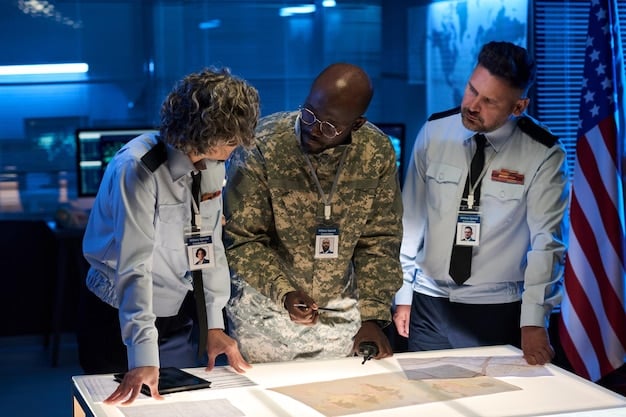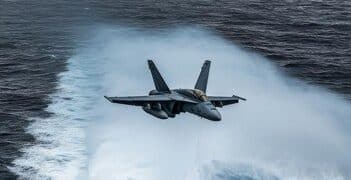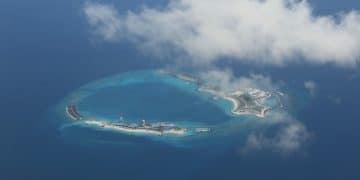How a 5% Defense Spending Hike Will Reshape US Mideast Policy

How Will the Projected 5% Increase in Defense Spending Impact US Foreign Policy in the Middle East in 2025? It could lead to increased military presence, strengthened alliances with regional partners, and potentially more assertive intervention in ongoing conflicts, while also influencing diplomatic efforts and arms sales policies.
What will a bigger defense budget mean for US actions in the Middle East? Let’s explore How Will the Projected 5% Increase in Defense Spending Impact US Foreign Policy in the Middle East in 2025? and what it means from military actions to diplomacy.
Understanding the Defense Budget Increase
Understanding the specifics of the defense budget increase is crucial. It’s not just about a 5% rise; it’s about where that money is allocated and how it reflects strategic priorities. Let’s delve into the details.
Areas of Budgetary Focus
The increased defense budget is expected to focus on several key areas, including technological advancements and regional security initiatives.
Modernization efforts will likely receive a significant boost, driving innovation in crucial sectors.
- Cybersecurity: Strengthening defenses against digital threats.
- Artificial Intelligence: Integrating AI into military operations.
- Advanced Weaponry: Developing next-generation combat systems.
The allocation of funds towards regional security initiatives suggests an increased emphasis on maintaining stability.
Geopolitical Implications
The increase in defense spending could also reflect evolving geopolitical realities, such as shifting power dynamics and emerging threats.
Additionally, it can influence international negotiations and diplomatic efforts in the Middle East.

In conclusion, understanding the nuances of the defense budget increase is essential. This involves examining its key focus areas and geopolitical implications to anticipate the full effect on US foreign policy.
Potential Military Implications
The projected increase in defense spending could significantly impact military operations and force posture in the Middle East. Let’s examine the possible consequences.
Increased Military Presence
A larger budget might enable the US to enhance its military presence in strategic locations, increasing patrol frequency and broadening operational scope.
This could translate to more maritime patrols in vital shipping lanes and heightened surveillance capabilities in regions with heightened security risks.
Enhanced Training Exercises
The extra funds might facilitate more collaborative training exercises with regional partners, boosting interoperability and readiness.
- Joint Operations: Conducting simulated combat scenarios.
- Intelligence Sharing: Improving information flow and analysis capabilities.
- Rapid Response Drills: Practicing quick coordination in emergencies.
These improvements in training improve the preparedness of the US and its allies confronting regional threats.
Moreover, enhanced military capabilities could also impact the dynamics of local conflicts, potentially altering their duration or outcome.
To summarize, the potential military implications of increased defense spending are substantial. These include enhanced presence, training, and force modernization, which could collectively shape the US strategy in the Middle East.
Diplomatic Ramifications
Defense spending isn’t just about military power; it also impacts diplomatic efforts. Let’s see what changes might occur in US diplomacy in the Middle East.
Increased spending can provide more leverage in negotiations, as it signals resolve and strength.
Strengthening Alliances
A bigger defense budget can strengthen relationships with allies through increased military aid and collaborative projects.
This could take the form of supplying advanced weaponry or providing logistical support to key regional partners.
Conflict Resolution
Improved defense capabilities might encourage the US to adopt a more assertive stance in conflict resolution.
- Mediation: Actively engaging in negotiations to broker peace agreements.
- Deterrence: Discouraging aggressive behavior from rival factions.
- Humanitarian Aid: Providing essential assistance in conflict zones.
However, this can sometimes lead to complications, as perceived interference may strain relationships with some countries.

In summary, increased defense spending has diverse diplomatic ramifications. It can strengthen alliances, influence conflict resolution strategies, and potentially create new challenges in the region.
Economic Impact
The economic impact of this increased defense spending is multifaceted. There are influences that relate to defense manufacturing and employment.
The boost can create jobs in the defense industry and related sectors.
Defense Manufacturing Boost
More defense spending often correlates with a surge in manufacturing activity, as companies ramp up production to meet new demands.
This can result in increased revenue, higher employment rates, and innovation in relevant sectors.
Trade Imbalances
Arms sales to Middle Eastern countries could affect trade balances, potentially escalating economic dependencies.
- Increased Exports: Boost in arms and defense equipment exports.
- Dependency Risks: Nations becoming overly reliant on US military aid.
- Offset Agreements: Negotiating to balance trade and investment.
However, it could also strain relationships with other nations that feel threatened by these arms deals.
In summary, the economic impact is both beneficial and complex. While it stimulates certain sectors, it also raises concerns about trade imbalances and economic dependencies.
Regional Power Dynamics
The increase in defense spending could reshape regional dynamics, affecting ongoing rivalries and collaborations in the Middle East.
Shifts in defense might impact the relationships between nations.
Arms Race Concerns
Increased US defense spending might fuel an arms race, pushing other nations to bolster their military too.
This can heighten instability and lead to increased military tensions in the region.
Counterterrorism Efforts
Improved capabilities could enhance counterterrorism efforts, helping to stabilize areas afflicted by extremism.
- Intelligence Gathering: Boosting surveillance and analytical resources.
- Special Operations: Conducting targeted missions against terrorist groups.
- Capacity Building: Training local forces to counter extremism.
However, it might also cause unintended consequences, such as increased civilian casualties or displacement.
In conclusion, an increased defense budget can create tensions, potentially prompting countermeasures from countries vying for regional influence.
Ethical Considerations
Ethical factors weigh heavily when considering increased defense spending. These dilemmas touch on human rights and accountability issues.
What are the moral responsibilities tied to defense actions?
Human Rights Concerns
Using increased military capabilities raises significant human rights concerns, especially in areas with ongoing conflicts.
Balancing security objectives with the preservation of fundamental rights can be challenging.
Accountability Measures
It is crucial to establish strict accountability mechanisms for military actions to prevent abuses. This includes transparency in operations and investigations of possible violations.
- Oversight Bodies: Establishing independent monitoring groups.
- Legal Frameworks: Upholding international laws and conventions.
- Training Programs: Promoting ethical conduct among military personnel.
Without these measures, there is a danger of eroding trust and provoking hostility from local populations.
In summary, thinking about ethics is an essential part of the discussion on enhanced defense spending. Dealing with ethical issues and fostering accountability is key to responsible US foreign policy.
| Key Point | Brief Description |
|---|---|
| 🚀 Military Presence | Increased US military presence in key Middle East locations. |
| 🤝 Allied Relations | Stronger alliances through defense agreements and support. |
| 💼 Economic Impact | Job creation in defense and shifts in trade balances. |
| 🛡️ Counterterrorism | Enhanced efforts to stabilize regions facing terrorism. |
Frequently Asked Questions
▼
The US military may increase its presence by establishing new bases or expanding existing ones.
▼
The spending may increase arms sales to allies to modernize their forces, heightening relationships.
▼
Diplomatic relations can be strengthened through alliances, or strained due to perceived interference.
▼
The balance of power may shift, leading to increased competition or tensions among regional actors.
▼
Ethical implications include upholding human rights, ensuring transparency, and maintaining accountability measures.
Conclusion
In conclusion, the projected 5% increase in defense spending will likely bring significant shifts to US foreign policy in the Middle East. From military readiness and diplomatic strategies to economic effects, the ripple effects promise to reshape the US involvement in the region. As these changes roll out, careful tracking and insightful analysis will be crucial for understanding their broader implications.





